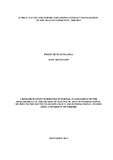| dc.description.abstract | The study examined ethics, norms and values of the Maasai and how they contribute to conflict management in the community. The study made an attempt to establish the main causes of conflict in the community that lives in East Africa, and how their culture has contributed towards resolving the conflicts, in an effort to learn and share the learning across the board in the field of International Conflict Management. Since 1890, the community has been faced with serious threats of survival as their culture has been scoffed at as backward and primitive, an excuse that has been used to decimate their most vital resource, land. Various agents have been the perpetrators behind this onslaught, but the overriding theme is modernity. The overall objective of the study was to examine the influence of ethics, values and norms on conflict management in the Maasai community. The study explored the duty theories, value theories and norm theories and beliefs and how they contribute to group cohesiveness, and help in management of divergent ethics values and norms. The research design used in this study was descriptive survey method as it allows for prudent comparison of the research findings. It also used both primary and secondary data to collect relevant information. Interviews were used to collect primary data from key informants while secondary data was obtained from textbooks, journals, and academic papers. These provided divergent practical, analytical and academic views on the Maasai dilemma. The major findings of the study is that there is a serious threat that the culture of the Maasai people is under a lot of pressure, and even though their culture has sustained them in spite of the attempts for erosion, modern practices have led to significant shifts in the culture. The other key finding is that the Maasai’s way of life, their rites and beliefs have held strong because of the strength of their ethics. It has held them together. The study also established detrimental effects of the conflict, which are associated with some of the people abandoning their way of life for a modern life they have not been prepared well to fit in. The study concludes that governments of Kenya and Tanzania, NGO’s and community based organizations must use integrated approaches, ensuring that their way of life is not interrupted and that their culture is harnessed, not castigated, through education. The study recommends the government should make it easy for the indigenous system to be incorporated into the contemporary conflict resolution system. The study recommends that conflict resolution and peace building mechanisms should be based on principles cherished and internalized by a community, and should be contextualized to capture their collective knowledge and experiences | en |

